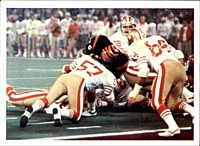1981–82 NFL playoffs

The 49ers playing against the Bengals in Super Bowl XVI.
|
|||
| Dates | December 27, 1981–January 24, 1982 | ||
|---|---|---|---|
| Teams | 10 | ||
| Defending champions |
Oakland Raiders (did not qualify) |
||
| Champions | San Francisco 49ers | ||
| Runners-up | Cincinnati Bengals | ||
| Matches played | 9 | ||
|
|||
The National Football League playoffs for the 1981 season began on December 27, 1981. The postseason tournament concluded with the San Francisco 49ers defeating the Cincinnati Bengals in Super Bowl XVI, 26–21, on January 24, 1982, at the Pontiac Silverdome in Pontiac, Michigan.
Both conference champions had losing records the previous season, the only time this has happened. All four AFC playoff games were between teams who had never faced each other in the postseason before. This was the only time this happened in either conference since the playoffs were expanded to 10 teams in 1978.
This was also the first year that both New York City area teams, the Giants and the Jets, made the playoffs together in the same year.
Within each conference, the three division winners and the two wild card teams (the top two non-division winners with the best overall regular season records) qualified for the playoffs. The three division winners were seeded 1 through 3 based on their overall won-lost-tied record, and the wild card teams were seeded 4 and 5. The NFL did not use a fixed bracket playoff system. In the first round, dubbed the wild-card playoffs or wild-card weekend, the fourth seed wild card hosted the fifth seed. All three division winners from each conference then received a bye in the first round. The second round, the divisional playoffs, had a restriction where two teams from the same division could not meet: the surviving wild card team visited the division champion outside its own division that had the higher seed, and the remaining two teams from that conference played each other. The two surviving teams from each conference's divisional playoff games then meet in the respective AFC and NFC Conference Championship games, hosted by the higher seed. Although the Super Bowl, the fourth and final round of the playoffs, was played at a neutral site, the designated home team was based on an annual rotation by conference.
Bills defensive back Bill Simpson's interception at the Buffalo 1-yard line with two seconds left in the game preserved a 31–27 victory and gave Buffalo their first playoff win since 1965. This would also turn out to be the final NFL playoff game at Shea Stadium, as the Jets moved to Giants Stadium three years later.
...
Wikipedia
